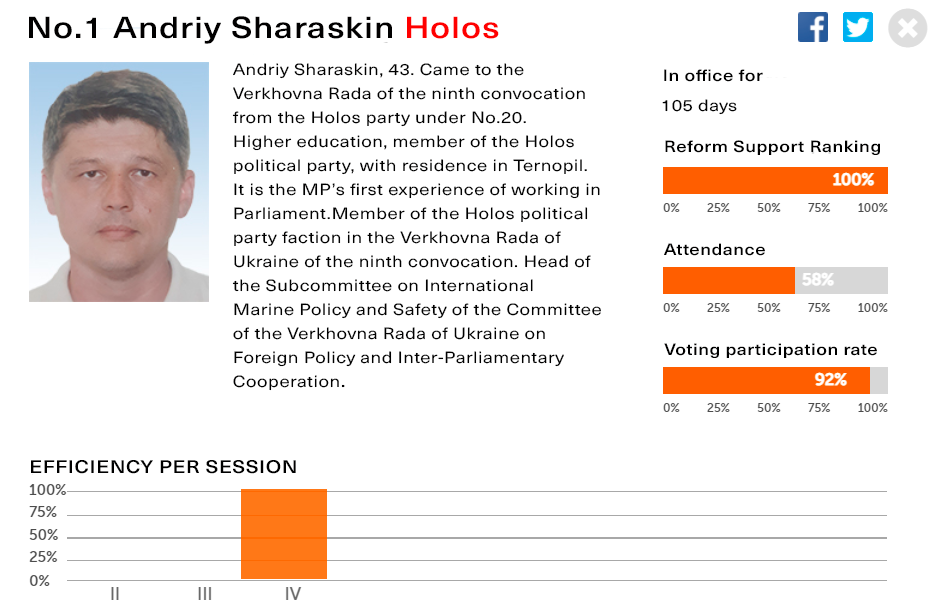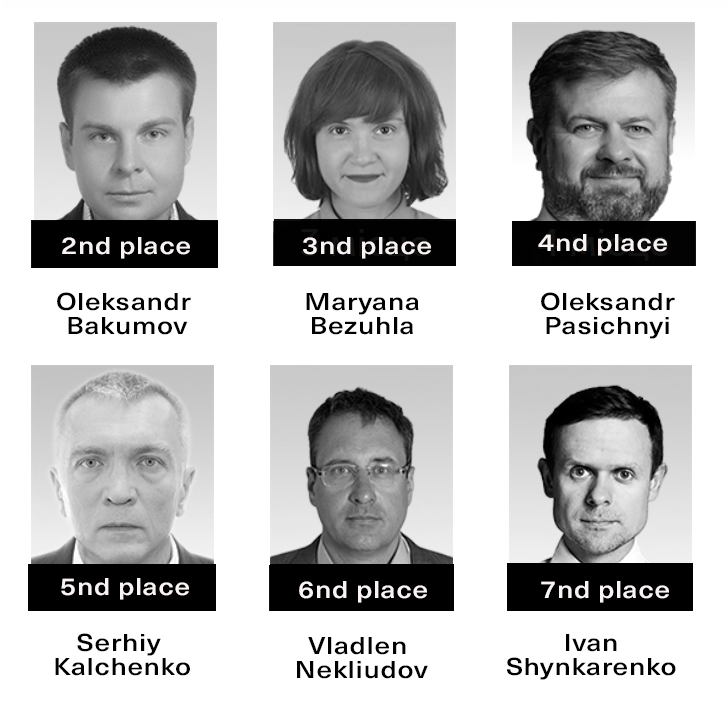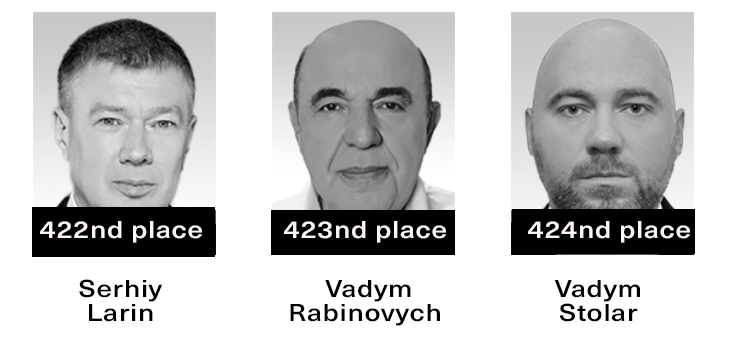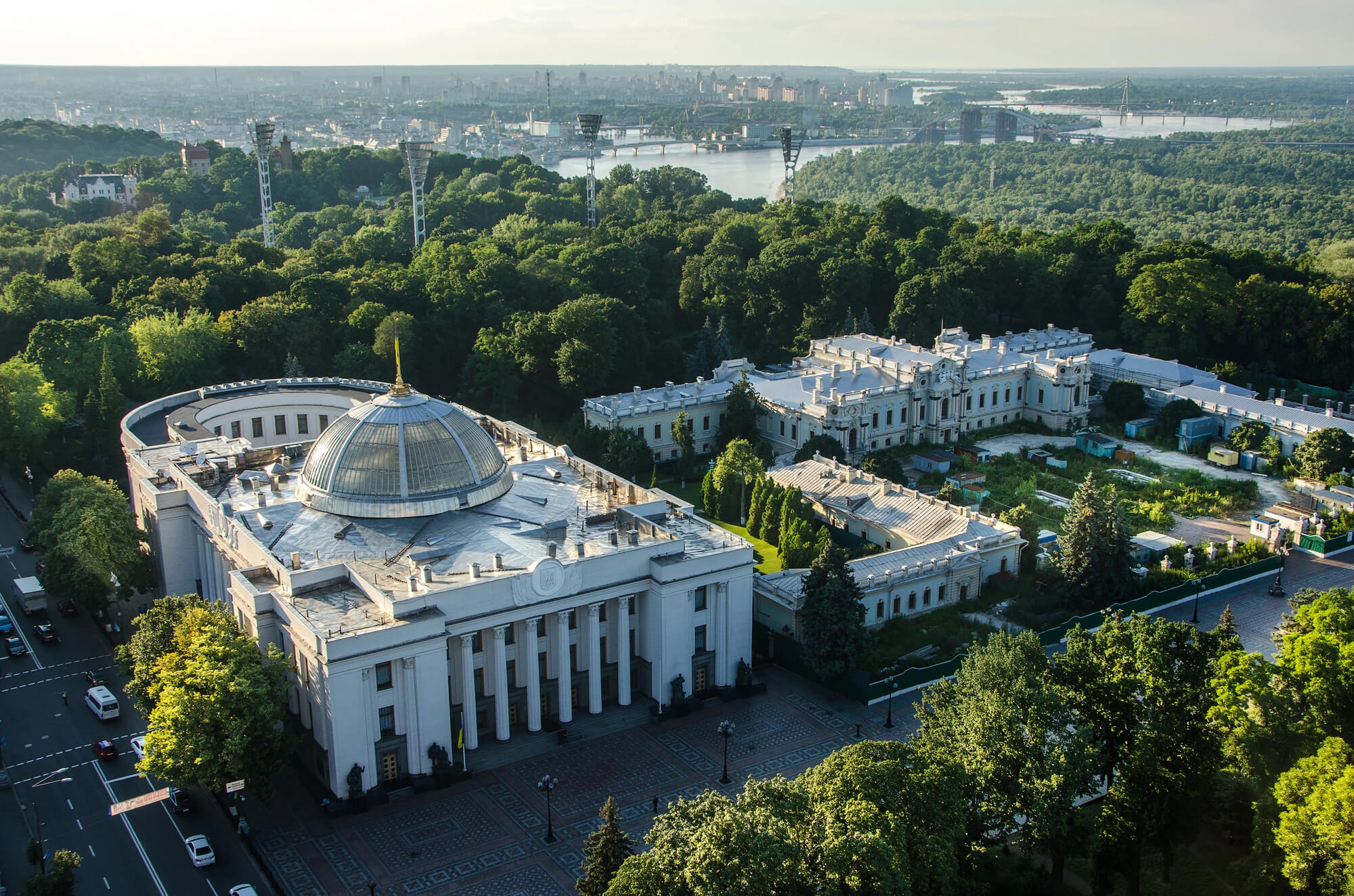The number of pro-reform MPs in the Verkhovna Rada of the ninth convocation decreases with each new session. VoxUkraine updated its reform-related MPs efficiency index and analyzed the deputies’ tendencies in supporting reform. The good news is that some MPs previously not supportive of reforms now joined the group of “moderate reformers.” The bad news is that other MPs who used to regularly support reforms, also became part of the aforesaid group.
The new Verkhovna Rada began working at a rapid pace – over the first four months of its work, Parliament passed 72 reform bills. After the second session, however, the “turbo mode” stopped, with reform bills halving in number (31). During the fourth session, the Reform Index was also low, and “thanks” to the Constitutional Court’s decision it fell below zero for the first time in its history. Similar tendencies were observed in the previous Parliament. At the beginning of 2015, the Verkhovna Rada of the eighth convocation adopted many reforms, but the pace of reform subsequently slowed down. Like in the fall of 2017, the MPs of the Verkhovna Rada of the ninth convocation passed 25 bills affecting the country’s reform agenda.
Despite the slower pace of reform, the average level of support (66%) remains unchanged. Average attendance of the Verkhovna Rada sessions decreased to 72% compared to 91% during the second session (the former lasted only one day) and 75% during the third session.
For the first time in the Verkhovna Rada of the ninth convocation, the top reformer is an MP not from the Servant of the People faction.
MPs efficiency index is a tool for assessing the work of Verkhovna Rada deputies. It shows how each MP supports the country’s reforms.
We receive the list of reform laws from iMoRe experts.
How do MPs get their position in the ranking? The experts assess each law using a scale from -5 to +5 based on the anticipated impact on the Ukrainian economy. Each MP voting in favor of the bill receives the points assigned to this law by the iMoRe experts. When MPs vote for reforms, they get good rankings, while anti-reforms (i.e. laws assessed negatively) reduce the MPs’ individual rankings.
MPs, therefore, get the highest ranking if they supported reform laws and did not vote for anti-reforms.
Cumulative point ranking logic is used, meaning that the final score is calculated based on MPs’ votes starting from the day they came to Parliament. The overall reform support ranking is an average value of support for each session.
Main conclusions:
- Topping the reform support rankings is, again, a “new face” – Andriy Sharaskin, a Holos faction MP who came to Parliament only in November 2020. Like six months ago, finishing in second place are consistent reformers – the 6 MPs from SoP with an average level of support for reform of 97%.
- Support for reform on the part of Servant of the People and For Life members sagged noticeably, while it became stronger with Dovira and ES deputies and remained almost unchanged with the rest.
- The number of reformers is going down as is the number of anti-reformers. Instead, “moderate reformers” are growing in number, i.e. those whose support for reform is 40-88%. Currently, there are 233 such MPs compared to 219 of the third session.
- At the same time, the number of MPs not supporting any reforms grew from 5 to 11.
Reform champions: Holos and Servant of the People
During the previous sessions, the most active reformers came from the Servant of the People faction (based on the results of the second and third sessions). As for the fourth session, “cyborg” Andriy Sharaskin from the Holos faction placed first among the reformers.
Figure 1. Rankings leader

He became an MP on November 6, 2020 replacing Sviatoslav Vakarchuk in the faction list. During his short tenure as an MP, Sharaskin voted in favor of all the four reform laws passed at the time. His support for reform is, therefore, 100%. We hope that Andriy Andriyovych [Sharaskin] will continue to support reforms and top the rankings also during future sessions.
The previous rankings leader, Oleksandr Sanchenko, failed to do so after topping the rankings based on his performance results during the third session, also right after becoming an MP. He fell from 1st position to 90th, with support for reform of 90%. Although his support for reform was 98% during his first session, it was already 82% during the fourth session.
Despite a change in the rankings leader, lower places are shared between the MPs who can roughly be called consistent reformers.
Figure 2. Second place in the rankings

These are the following six MPs from Servant of the People: Oleksandr Bakumov, Maryana Bezuhla, Oleksandr Pasichnyi, Serhiy Kalchenko, Vladlen Nekliudov and Ivan Shynkarenko. Based on their performance records for the previous session, they also placed second back then, but as part of a larger group (overall, 16 MPs won the silver at the time).
These rankings leaders maintain the best momentum of support for reform. After the second session, their level of support for reform was 92%, subsequently increasing to 98% and reaching 100% during the fourth session. The average level of support for reform during all the sessions of each of the top six MPs is 97%.
Eternal oppositionists: OPFL
While more new faces appear as leaders in supporting reform efforts, the MPs who regularly opposed reform over the four sessions are well known to us.
Figure 3. Reform opponents

Based on their performance records for the fourth session, the top anti-reformers are OPFL MPs Vadym Stolar, Vadym Rabinovych (1% support for reform each) and Serhiy Larin (3%). All three did not vote for any reform bills during the last two sessions, with their reform support ranking coming from their voting for reform bills during the second session. There were also five other MPs who did not vote for reforms during the third session, all of them from OPFL. The fourth session already had 11 such unflinching anti-reformers. Stepan Ivakhiv from For Future, Valeriy Dubil from Batkivshchyna and non-faction MP Andriy Derkach also joined these OPFL MPs’ ranks.
Although more non-voters end up among the anti-reformers, the overall number of anti-reformers is decreasing. Read further about a rough division of MPs into groups.
How the factions support reform
As evidenced by the last session, the reformer faction status was confirmed by Servant of the People (84%) and Holos (72%). On average, these factions’ MPs alone vote in favor of reform more than the entire Parliament (66%).
Figure 4. Factions’ level of support for reform
The Servant of the People faction’s support for reform decreased during the third session, falling nearly 7% compared to the second session. The fourth session showed that 84-83% support for reform is becoming a norm for the presidential faction.
Instead, a positive upward trend of supporting reforms is shown by the ES (from 56% to 61%) and Dovira (from 58% to 62%) factions.
The Holos faction MPs have consistently promoted reforms, giving them 72% support.
Just as consistent but to the contrary are the factions giving insufficient support to reform. These are non-faction MPs (38%), MPs from Batkivshchyna (30%) and OPFL (17%).
Tending toward average
The number of moderate reformers is growing while that of staunch reform opponents and reformers is decreasing.
We roughly divided MPs into three groups based on their level of support for reform: reformers (voting for 100%-89% reforms), moderate reformers (with 88-40% support for reform) and reform opponents / anti-reformers (39%-0%).
Figure 5. Number of faction MPs in the groups
Explanations to the Graph: Reformers are those MPs whose support for reform is 100%-89%, moderate reformers are those giving 88%-40% support, and anti-reformers 39%-0% support.
Moderate reformers constitute the largest group in Parliament. During the fourth session, fourteen MPs joined it making their total number 233. This happened because seven “Servants” began supporting reforms less, drifting to the moderate reformer group (NB: after the third session, 75 MPs from Servant of the People drifted from reformers to moderate reformers). In addition to these seven, two more MPs close to the presidential faction began giving less support to reform, namely speaker Dmytro Razumkov (his support for reform fell from 88% after the third session to 84% after the fourth) and his first deputy Ruslan Stefanchuk who began voting much less for reform laws (from 98% during the third session to 69% during the fourth).
At the same time, five Batkivshchyna MPs began voting more in favor of reform, leaving the anti-reformer group for the moderate reformer group. MPs Kucherenko, Nalyvaichenko, Volynets, Ivchenko, Puziychuk began supporting reforms more during the fourth session (on average by 8%). Currently, their average support for reform is 44%, which placed them among the reformers.
The group of moderate reformers includes the entire Holos faction (except for the reformer Sharaskin), nearly the entire ES (25 out of 27 MPs), 143 ”Servants”, and nearly all deputies from the Dovira faction (except for the anti-reformer Hennadiy Vatsak).
With the reformer group decreasing in numbers (from 112 after the third session to 103 after the fourth session), the anti-reformers grew fewer too. Currently, there are 87 reform opponents in Parliament (formerly 94 MPs).
The group of anti-reformers consists of the entire OPFL faction, most members of For Future (18 out of 24 MPs) and Batkivshchyna (16 out of 24 MPs).
As during the previous session, the ES and Servant of the People factions have MPs who, contrary to the entire faction, did not support reforms.
These are Mustafa Dzhemilev from ES, whose support for reform was 32% during the fourth session, with the overall 29% support since the start of his tenure.
Another anti-reform MP from ES is ex-president Petro Poroshenko who voted for reform bills during the fourth session even worse than during the previous session. His support for reform of 39% during the third session (bordering on moderate reformers) fell to 12%. On average, during all the sessions of the ninth convocation, his level of support for reform was 19%.
Former member of Servant of the People faction, Oleksandr Dubinskyi, remains a staunch anti-reformer, with his support for reform being 27%. During the fourth session, he began voting a bit more in favor of reform oriented bills (24% support versus 18% during the third session).
Which areas of reform are promoted by MPs?
The fourth session confirmed that each faction has its favorite areas of reform that they actively support.
Figure 6. Factions’ average level of support for reform
Although support for reform overall remains high, there are certain areas that are being reformed thanks to Servant of the People voting jointly with some other faction. Sometimes, an opposition one.
For example, Batkivshchyna is an anti-reform faction with average support for reform of 30%. However, it continues to support public finance management reform (those are usually the laws increasing the social safety net) enthusiastically voting for bills aiming to reform the business environment. On average, these areas of reform receive Batkivshchyna MPs’ support of 69% and 73% respectively.
The anti-reform faction For Future on average gives reforms 34% support, actively voting for reforms relating to public debt (with average support of 70%).
Like during the 3rd session, the MPs from Holos (72%) and ES (59%) vote most in favor of bills aiming to reform the energy sector. They are even more supportive of the energy sector than SoP (54%).
It is already a third session in a row that the presidential faction Servant of the People is the only one conducting competition policy and civil service reforms. Competition policy has the faction’s support of 91%, with the rest of Parliament of less than 50%. However, only one law on supporting foreign film production in Ukraine was voted for in the area of competition policy during the work of Parliament of the ninth convocation. As for civil service, only one law was passed during the ninth convocation – on rebooting power, which the experts assigned 0.25 points (the law contains both positive and negative changes resulting in different expert opinions).
Among the areas of reform receiving most support are public spending (average support of 74%), governance (73%), other in business environment (72%). All three are voted for by Servant of the People, Holos, ES and Batkivshchyna.
* There are, however, only two laws here: on the prohibition of the continuous deforestation in the Carpathians and on road safety.
Attention
The author doesn`t work for, consult to, own shares in or receive funding from any company or organization that would benefit from this article, and have no relevant affiliations



